Northern Trust Bundle
Can Northern Trust Continue Its Reign in the Financial World?
Founded in 1889, Northern Trust has a long history as a global financial services leader. But what does the future hold for this financial giant? With a focus on Northern Trust SWOT Analysis, this deep dive explores the company's strategies and outlook in the evolving financial services industry.
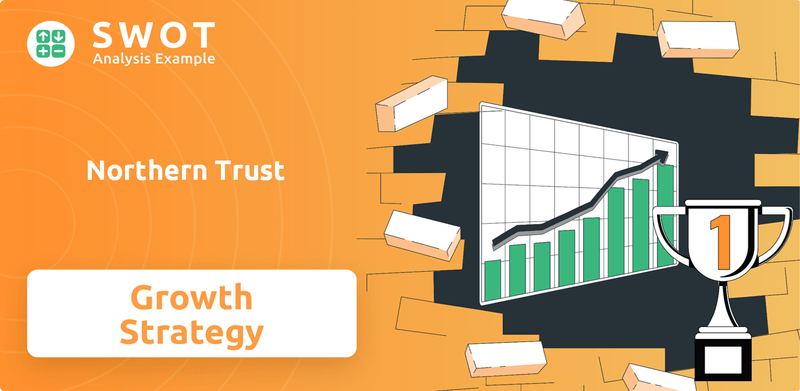
This comprehensive analysis of Northern Trust's growth strategy and future prospects will delve into its core business areas, including asset management and wealth management, and assess its market position. We'll explore how Northern Trust is navigating the competitive landscape and adapting to market trends. Analyzing its strategic initiatives, from digital transformation to expansion plans, will provide a clear picture of Northern Trust's path forward and its potential for continued success in the financial services industry.
How Is Northern Trust Expanding Its Reach?
The expansion strategy of Northern Trust centers on organic growth, strategic partnerships, and the enhancement of existing services. This approach aims to reach new customer segments and diversify revenue streams. According to CEO Michael O'Grady, the company is focused on accelerating growth. This strategy includes scaling private market services and launching additional ETFs for alternative investments.
A key element of the company's growth strategy involves expanding its wealth management services. Northern Trust has introduced 'Family Office Solutions,' a dedicated segment targeting individuals and families with over $100 million in net worth. The company aims to leverage its global presence, with offices across the U.S., Canada, Europe, the Middle East, and the Asia-Pacific region, to support its expansion initiatives.
The company's strategic initiatives are supported by its global footprint, including offices in 24 U.S. states and Washington, D.C., and across 22 locations internationally. The company's future prospects also involve partnerships, such as the strategic cooperation agreement with the Shanghai Pudong Development Bank Tianjin Branch, aimed at increasing market share. Competitors Landscape of Northern Trust shows that the company is committed to expanding its business scope.
Northern Trust is increasing its focus on private market services. This expansion aligns with the growing interest in alternative investments among global asset owners. Private market assets constitute approximately 13% of the average portfolio.
The company plans to launch additional ETFs for alternative investments. This initiative aims to provide clients with more diverse investment options. This strategic move supports the company's growth strategy.
Northern Trust is expanding its wealth management services to cater to ultra-high-net-worth individuals. The 'Family Office Solutions' targets individuals and families with over $100 million in net worth. Early client traction has been reported.
The company maintains a global presence with offices in 24 U.S. states and Washington, D.C., and across 22 locations in Canada, Europe, the Middle East, and the Asia-Pacific region. This global footprint supports its expansion plans.
Northern Trust is forming strategic partnerships to expand its market share. The cooperation agreement with the Shanghai Pudong Development Bank Tianjin Branch is a key example. The Asset Management division anticipates growth in private credit, supported by a shift from traditional capital providers to private credit asset managers.
- The company anticipates lower interest rates to encourage more mergers and acquisitions in 2025.
- Private credit is expected to grow, supported by the shift from traditional capital providers.
- 86% of portfolios have some investment in private assets.
- The company is adapting to changing market conditions.
Northern Trust SWOT Analysis
- Complete SWOT Breakdown
- Fully Customizable
- Editable in Excel & Word
- Professional Formatting
- Investor-Ready Format
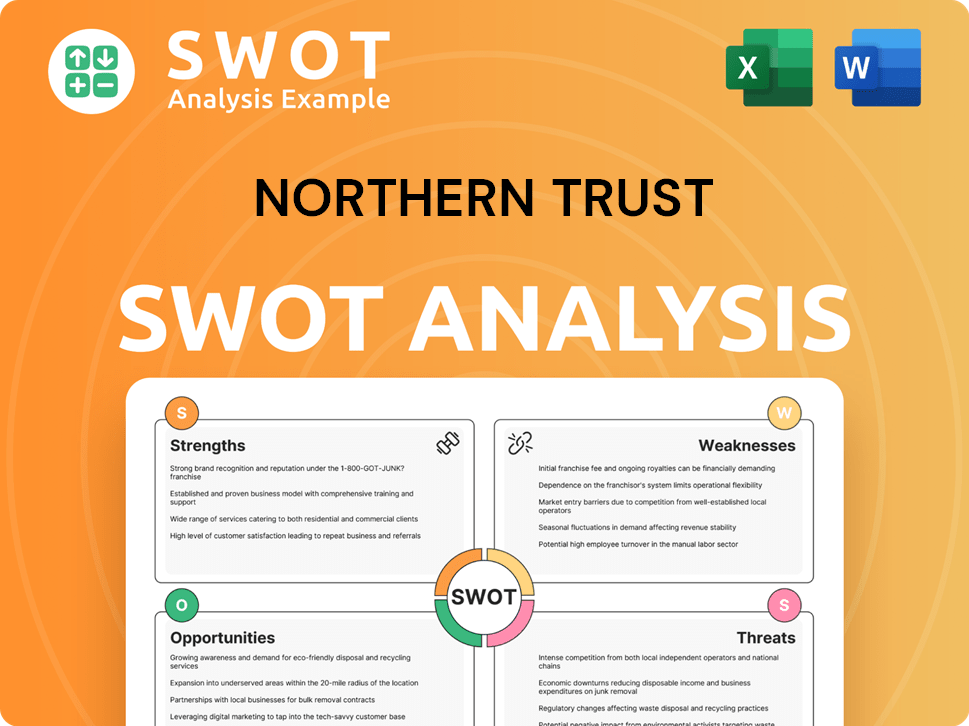
How Does Northern Trust Invest in Innovation?
The company's growth strategy heavily emphasizes leveraging technology and innovation to enhance its services and expand its market reach within the financial services industry. This approach is central to its future prospects, as it aims to improve efficiency, accuracy, and client experience through digital transformation and automation.
A key element of the company analysis involves its commitment to digital transformation, including significant investments in technology infrastructure and strategic partnerships. These initiatives are designed to streamline operations, improve data management, and offer advanced services, ultimately strengthening its competitive position in asset management and wealth management.
The company's focus on innovation is evident in its adoption of cutting-edge technologies, such as AI and cloud-based solutions, to meet evolving client needs and preferences. This forward-thinking approach is crucial for its long-term success and helps it navigate the complexities of the financial services sector.
The company is undergoing a multi-year technology transformation program. This program includes expanding its strategic relationship with Tata Consultancy Services (TCS).
The collaboration with TCS utilizes TCS BaNCS Global Securities Platform. The aim is to standardize settlement data and processes across 99 global markets.
The program enhances AI and analytics capabilities. This is for both digital and traditional assets to improve efficiency and risk mitigation.
The company began its digital workplace transformation in 2018. This transformation includes the implementation of Microsoft 365 and Microsoft Dynamics.
The digital initiatives have led to a 50% reduction in email traffic. Some teams can respond to client queries in a third of the time.
The company is exploring the rollout of Microsoft's AI copilot capabilities. It anticipates a 30% to 40% reduction in administrative work through AI.
The company's strategic initiatives also include a strong focus on digital customer experience. The firm was recognized in May 2025 as the 'Best Private Bank in the U.S. for Digital Wealth Planning' and 'Best Private Bank in the U.S. for Digital Customer Experience'. This recognition underscores the company's commitment to leveraging technology to enhance client services and improve overall satisfaction. Furthermore, according to the 2025 Global Investment Outlook, 'AI-Enabled Productivity' is a key theme expected to enhance economic growth, particularly in the U.S., by combating demographic shifts and boosting productivity. For more insights, consider reading about the Marketing Strategy of Northern Trust.
The company's technological advancements and strategic partnerships are designed to drive growth and improve operational efficiency.
- Multi-year technology transformation program with TCS to enhance the global securities settlements platform.
- Implementation of Microsoft 365 and Microsoft Dynamics for digital workplace transformation, leading to significant efficiency gains.
- Exploration of AI copilot capabilities to further reduce administrative work.
- Recognition as 'Best Private Bank in the U.S. for Digital Wealth Planning' and 'Best Private Bank in the U.S. for Digital Customer Experience'.
- Focus on 'AI-Enabled Productivity' as a key theme for enhancing economic growth.
Northern Trust PESTLE Analysis
- Covers All 6 PESTLE Categories
- No Research Needed – Save Hours of Work
- Built by Experts, Trusted by Consultants
- Instant Download, Ready to Use
- 100% Editable, Fully Customizable
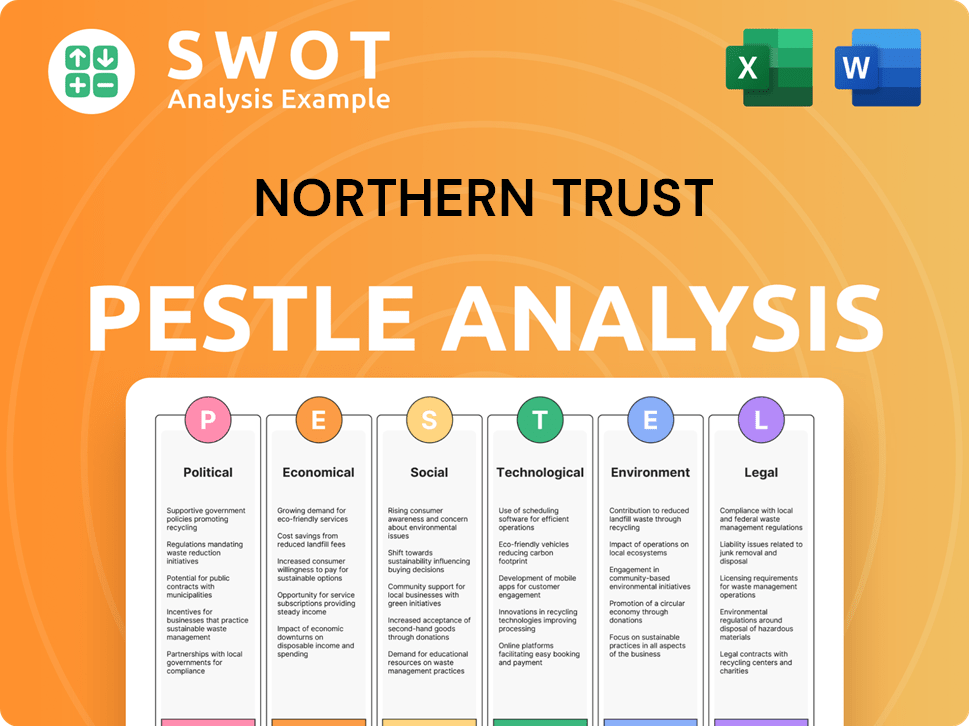
What Is Northern Trust’s Growth Forecast?
The financial outlook for Northern Trust demonstrates robust growth, particularly in early 2025, although there are some sequential pressures. The company's performance reflects its strong position in the financial services industry, driven by its asset management and wealth management divisions. This analysis provides insights into the company's financial health and future prospects, offering a detailed look at its strategic initiatives.
In Q1 2025, Northern Trust's net income was $392 million, an impressive 83% year-over-year increase. This growth was fueled by an 18% rise in total revenue year-over-year. The company's focus on investment strategies and client service has contributed to its success in the market. For a deeper understanding of its origins, consider reading a Brief History of Northern Trust.
The company's financial performance in 2024 was also strong, with an adjusted EPS of $9.78 and a net income of $2.03 billion, marking an 83.4% increase year-over-year. Total revenue for 2024 reached $1.97 billion, reflecting a 26% year-over-year increase. The net profit margin for the quarter ending March 31, 2025, was 13.57%, while the average net profit margin for 2024 was 10.08%, a 9.92% increase from 2023. These figures highlight the company's effective business model and its ability to generate substantial returns.
Diluted earnings per share (EPS) for Q1 2025 reached $1.90, a 99% increase from Q1 2024. This growth, however, represented a 16% sequential decline from Q4 2024's $2.26. Total wealth management trust, investment, and other servicing fees rose 8% year-on-year in Q1 2025 to $541.9 million.
Assets under management (AuM) stood at $1.607 trillion at the end of March 2025, a 7% increase from a year earlier. Wealth management AuM rose 6% to $446.9 billion. This growth reflects the company's strong market position and effective asset management strategies.
Total assets under custody/administration increased 3% year-on-year to $16.92 trillion. This growth demonstrates the trust clients place in the company's services and its ability to manage large-scale assets effectively. The company's strategic initiatives are key to maintaining this trend.
Analysts forecast Northern Trust's non-GAAP EPS to be $8.17 for fiscal 2025, a 6.1% increase from fiscal 2024, and to grow nearly 9.6% year-over-year to $8.95 in fiscal 2026. These projections highlight the positive outlook for the company's future prospects.
Management has raised its full-year net interest income (NII) growth guidance from low-single digits to low-to-mid-single digits for 2025. This adjustment reflects strong deposit levels and stable pricing, indicating a positive trend in the company's financial health.
The company reaffirmed a full-year target for operating expense growth below 5%. This focus on cost management is crucial for maintaining profitability and supporting the company's long-term growth strategy. The ability to control expenses is a key aspect of Northern Trust's business model.
Northern Trust Asset Management's 2025 Global Investment Outlook anticipates strong earnings and healthy sales growth to support U.S. stock outperformance. This outlook suggests continued growth in the asset management division, driven by effective investment strategies.
The outlook expects softer but continued U.S. economic growth to translate into healthy earnings and revenue growth. This expectation underscores the company's resilience and its ability to adapt to changing market conditions. The company's risk management strategies are also key to navigating these conditions.
The company is actively pursuing digital transformation to improve its services and efficiency. This initiative is expected to enhance client experience and streamline operations. Innovation is a key driver of Northern Trust's future prospects.
Northern Trust is committed to sustainability initiatives, integrating environmental, social, and governance (ESG) factors into its investment strategies. This commitment aligns with the growing importance of sustainability in the financial services industry. These initiatives are integral to the company's long-term growth strategy.
Northern Trust Business Model Canvas
- Complete 9-Block Business Model Canvas
- Effortlessly Communicate Your Business Strategy
- Investor-Ready BMC Format
- 100% Editable and Customizable
- Clear and Structured Layout
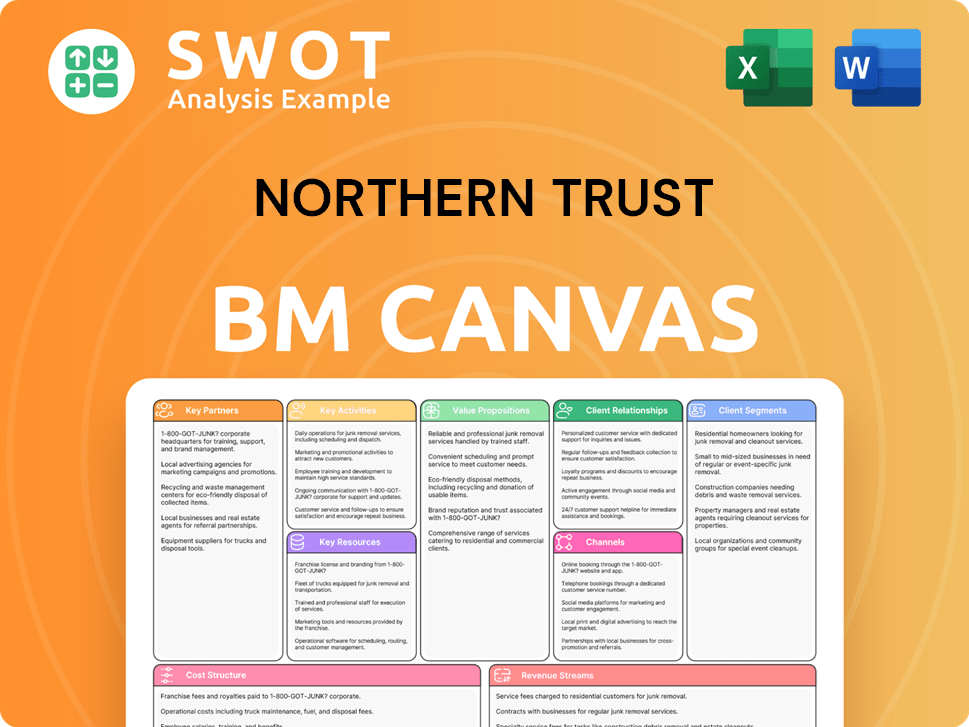
What Risks Could Slow Northern Trust’s Growth?
The path to growth for Northern Trust, like any major player in the financial services industry, is fraught with potential risks and obstacles. These challenges span market volatility, operational hurdles, credit risks, and the ever-present specter of regulatory and legal changes. Understanding these potential pitfalls is crucial for assessing the company's future prospects and its ability to execute its growth strategy.
One of the primary concerns revolves around the sensitivity of Northern Trust's financial performance to shifts in interest rates. Furthermore, the company faces operational risks, including the need to adapt to technological advancements and maintain robust cybersecurity measures. The ability to navigate these diverse challenges will significantly influence Northern Trust's ability to maintain its market position and achieve its strategic objectives.
The company's risk management framework encompasses a wide array of areas, including information technology and cybersecurity, compliance, fiduciary responsibilities, and legal matters. These elements are critical for protecting the company's assets and reputation. Successfully managing these risks is essential for the long-term health and sustainability of the business.
A key risk for Northern Trust is the impact of interest rate changes on its net interest income (NII). A decrease of 100 basis points in interest rates could reduce NII by $71 million. This sensitivity highlights the company's vulnerability to fluctuations in the interest rate environment, potentially affecting its profitability.
The rise in watch list loans, especially in the commercial real estate (CRE) sector, poses a significant risk. A 95% increase in CRE loans rated between 6 and 9 suggests growing stress within this portfolio. Deteriorating economic conditions could exacerbate this risk.
Regulatory changes, such as the implementation of Basel III Endgame (B3E) regulations, are expected to increase Northern Trust's risk-weighted assets by 5-15%. This could impact capital requirements and strategic asset allocation decisions. Compliance with new regulations adds to operational complexity.
Geopolitical and domestic political instability, along with interest rate changes, are identified as top external investment challenges. Management acknowledges macroeconomic uncertainties and market volatility as ongoing challenges, which can affect investment strategies and overall performance.
Rising expenses due to modernization and technology investments are a concern. However, the company is mitigating these through targeted cost controls and productivity initiatives. Managing these expenses is crucial for maintaining profitability and operational efficiency.
Northern Trust's stock has a beta of 1.19, indicating slightly higher volatility compared to the broader market. This means the stock may experience more significant price swings than the overall market. Investors should consider this when evaluating their investment.
Northern Trust's approach to risk management is comprehensive, covering market, operational, credit, liquidity, and regulatory risks. The company focuses on mitigating these risks through robust frameworks. This approach is vital for safeguarding the firm's financial health and protecting its clients' assets.
Increased loan portfolio risk may necessitate allocating more capital to cover potential losses. This could potentially limit growth opportunities or capital returns to shareholders. Careful management of capital is essential for maintaining financial flexibility and supporting strategic initiatives.
Northern Trust Porter's Five Forces Analysis
- Covers All 5 Competitive Forces in Detail
- Structured for Consultants, Students, and Founders
- 100% Editable in Microsoft Word & Excel
- Instant Digital Download – Use Immediately
- Compatible with Mac & PC – Fully Unlocked
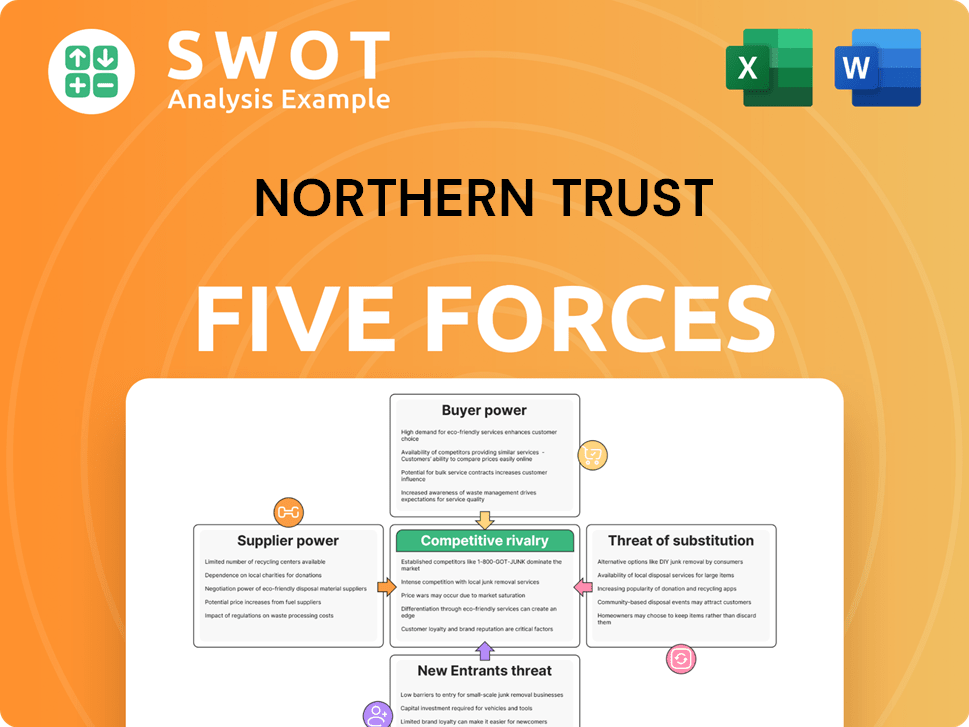
Related Blogs
- What are Mission Vision & Core Values of Northern Trust Company?
- What is Competitive Landscape of Northern Trust Company?
- How Does Northern Trust Company Work?
- What is Sales and Marketing Strategy of Northern Trust Company?
- What is Brief History of Northern Trust Company?
- Who Owns Northern Trust Company?
- What is Customer Demographics and Target Market of Northern Trust Company?
Disclaimer
All information, articles, and product details provided on this website are for general informational and educational purposes only. We do not claim any ownership over, nor do we intend to infringe upon, any trademarks, copyrights, logos, brand names, or other intellectual property mentioned or depicted on this site. Such intellectual property remains the property of its respective owners, and any references here are made solely for identification or informational purposes, without implying any affiliation, endorsement, or partnership.
We make no representations or warranties, express or implied, regarding the accuracy, completeness, or suitability of any content or products presented. Nothing on this website should be construed as legal, tax, investment, financial, medical, or other professional advice. In addition, no part of this site—including articles or product references—constitutes a solicitation, recommendation, endorsement, advertisement, or offer to buy or sell any securities, franchises, or other financial instruments, particularly in jurisdictions where such activity would be unlawful.
All content is of a general nature and may not address the specific circumstances of any individual or entity. It is not a substitute for professional advice or services. Any actions you take based on the information provided here are strictly at your own risk. You accept full responsibility for any decisions or outcomes arising from your use of this website and agree to release us from any liability in connection with your use of, or reliance upon, the content or products found herein.